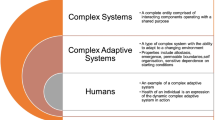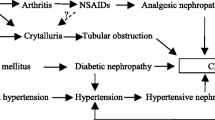Abstract
Mental models of health and illness used during clinical practice are predominantly based on reductionism and mechanistic explanations. Systems thinking offers a more holistic conceptualization by viewing the human body to consist of several closely linked organ systems, constantly interacting with each other and embedded in, and ‘open’ to, the external environment. Operationalizing this view to clinical reasoning at the bedside requires networked thinking, concept maps, and tools such as Clinical Reasoning Map (CRM). These are diagrammatic methods that explicitly depict the links across multiple nodes such as diseases, disorders, clinical features, and pathogenetic mechanisms. Systems thinking could be extended to rhizomatic thinking where a metaphor of the rhizome is applied to view complex clinical scenarios. It helps to deepen the understanding of the interconnected nature of cases and the multiple pathogenic pathways, generate differential diagnoses, and predict future prognostic pathways. In the case of planning and providing care, rhizomatic thinking will shift emphasis from a biomedical model to include the social systems, ecosystems, and the built environment. It adds to the growing corpus of novel complex thinking such as whole systems thinking and synergetics, described by Edgar Morin. It is a novel approach to clinical practice, clinical reasoning and its pedagogy.
Access this chapter
Tax calculation will be finalised at checkout
Purchases are for personal use only
Similar content being viewed by others
References
Barrows, H. S., & Tamblyn, R. M. (1980). Problem-based learning: An approach to medical education. Springer Publishing Company.
Capra F. & Luisi, P. L. (2016). The systems view of life (A Unifying Vision) Cambridge University Press; 1st edition (August 1, 2016).
Colombat, A. P. (1991). A thousand trails to work with Deleuze. SubStance, 20, 10–23.
Douglas-Jones, R. C., & Sariola, S. (2009). Rhizome yourself : experiencing Deleuze and Guattari from theory to practice. Rhizomes, 19 (Summer). http://www.rhizomes.net/issue19/sariola.html.
Fortunato, S., Bergstrom, C. T., Börner, K., Evans, J. A., Helbing, D., Milojević, S., Petersen, A. M., Radicchi, F., Sinatra, R., Uzzi, B., Vespignani, A., Waltman, L., Wang, D., Barabási, A. L. (2018). Science of science. Science. 359(6379), eaao0185. https://doi.org/10.1126/science.aao0185.
Jayasinghe, S. (2011). Conceptualising population health: From mechanistic thinking to complexity science. Emerging Themes in Epidemiology., 8, 2. https://doi.org/10.1186/1742-7622-8-212
Jayasinghe, S. (2012). Complexity science to conceptualize health and disease: Is it relevant to clinical medicine. Mayo Clinic Proceedings, 87(4), 314–319.
Jayasinghe, S. (2016). Describing complex clinical scenarios at the bed-side: Is a systems science approach useful? Exploring a novel diagrammatic approach to facilitate clinical reasoning. BMC Medical Education, 16, 264. https://doi.org/10.1186/s12909-016-0787-x
Johnson-Laird, P. N. (1980). Mental Models in Cognitive Science. Cognitive Science, 4, 71–115.
Kahneman, D. (2011). Thinking fast and slow. Straus and Giroux.
Kaplan, J. M., & Valles, S. A. (2019). Reflecting on what philosophy of epidemiology is and does, as the field comes into its own: Introduction to the Special Issue on Philosophy of Epidemiology. Synthese. https://doi.org/10.1007/s11229-019-02252-3.
Kresh, J. Y. (2006). Integrative systems view of life: Perspectives from general systems thinking. In T. S. Deisboeck & J. Y. Kresh (Eds.), Complex systems science in biomedicine (pp. 3–29). Springer.
Snowden, D. J., & Boone, M. E. (2007). A leader’s framework for decision-making. Harvard Business Review., 85, 68–76.
Author information
Authors and Affiliations
Corresponding author
Editor information
Editors and Affiliations
Rights and permissions
Copyright information
© 2023 The Author(s), under exclusive license to Springer Nature Singapore Pte Ltd.
About this chapter
Cite this chapter
Jayasinghe, S. (2023). Exploring Rhizomatic Thinking in Clinical Reasoning. In: Khine, M.S. (eds) Rhizome Metaphor. Springer, Singapore. https://doi.org/10.1007/978-981-19-9056-4_12
Download citation
DOI: https://doi.org/10.1007/978-981-19-9056-4_12
Published:
Publisher Name: Springer, Singapore
Print ISBN: 978-981-19-9055-7
Online ISBN: 978-981-19-9056-4
eBook Packages: EducationEducation (R0)




